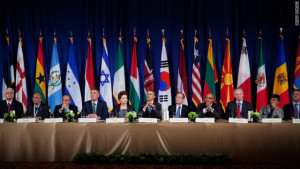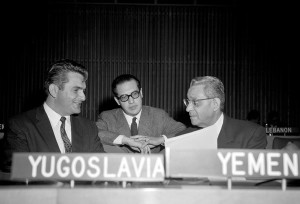
President Obama participates in the Open Government Partnership event with world leaders at the United Nations.
There are two kinds of delegates at any Model UN conference. There’s the one delegate who walks into committee with an impressive — yet catchy — acronym on the first day, raises their voice and snatches the bloc laptop upon seeing the chair make rounds, and makes a point of showcasing a 150-paged binder of research. They are evidently manipulative; someone’s clauses ‘mysteriously’ disappear, they treat the Question & Answer session’s microphone as something gorilla-glued to their hands, and always turn in the USB first – and personally – with the greatest finesse. In the first un-moderated caucus, they either stand on a chair or proudly boom into the committee microphone, as if they are Beyonce, making it clear they are the ones to bloc with. Their presence is everywhere; their country is the first to appear on the sponsors list, the loudest voice to slash other’s draft-resolutions, and the bloc member to answer as many, if all, Q& A questions of a draft resolution for as much spotlight as possible.
As Model UN delegates, we all know this delegate. In some cases, many of us have even been trained to be this delegate. There’s no question that these qualities can command a room. It is not that this delegate is necessarily a bad committee member… They are well researched and make a point of selling their standpoint with constant speaking time and eloquent orating. But we can all agree, after a few moderated caucuses, their ‘orations’ can begin to sound like what they really are: whining. After a while, un-moderated caucuses can transform from ‘collaboration,’ to ‘machination,’ or ‘scheming.’ Instead of a power delegate, let’s call this delegate for what they really are: the ‘used car salesman’. Their spiels are crafted to sell the crowd and its chairs, however content and authenticity are missing.
Then, there is the other delegate. This is the delegate that even when leaving a conference empty-handed, their committee members are in complete disbelief they didn’t take the top award home. This is the delegate that doesn’t have to strategically cut names off draft resolutions for the sake of being ‘first,’ or demand the largest bloc of followers in the room. This delegate carries their message with a drive to create dialogue – and when relevant—not sounding like a broken record in moderated caucuses for sake of keeping skin in the game. This delegate empowers fellow bloc members to contribute their answers and thoughts for the sake of creating an applicable resolution, not for grooming themselves to be the Best Delegate. This is a delegate that doesn’t’ network for the pure sake of creating allies in the committee room, but also for making lasting friends on the circuit. There is a tone in their message: a thought-out, built-upon roadmap to resolution and balanced bloc. And at the end of the day, they will still be pointed to as the natural bloc leader, natural orator, navigator, trustworthy confidant, the delegate that makes leading look easy, effortless.
As a delegate that has graduated to the collegiate circuit, I have seen the first delegate one too many times – and have, at times, even been one. It pains me to observe them because they are overworking themselves for a gavel that is many times yielded to politics, friendships, favoritism, or yes, the natural, deserved choice. Sometimes it is just as easy to walk into a committee room without a strategy or ‘Car Salesman’ tricks up your sleeve – and still earn that glimmering gavel at the end of the road. And hey, making friends and having fun in the process is an added plus.

UN Ambassadors attend the Thirteenth Session of the General Assembly, Diplomatic intercourse and immunities, at the United Nations Headquarters.
So here are three tips to avoid sounding forged and come across as the bona fide, top delegate:
1. Arrive early to committee and avoid discussing anything committee-related.
If the first thing that you ask a fellow delegate is the topic they plan to support first, you are broadcasting that there is only thing you are there for, and that is vying for advantage the first chance you get. Great delegates have the gavel in the back of their minds, but excellent delegates have a knack for concealing that goal very carefully. Instead, ask them questions about them, find things in common, and maybe make an acquaintance or two. It’s a simple concept, but many forget that blocs are many times forged through likeliness instead of talent or policy. It’s always better to have a bloc threaded by friendliness instead of pure competition.
- Do not, do not stand up on a chair, take hold of the committee microphone, or walk to the chair’s panel to announce where you will be meeting with your block.
It comes across as utterly arrogant. Instead of crafting a bloc with delegates with similar ideologies, you come across as assuming a following with you at the dead center. Furthermore, you appear to be putting on a show in front of the chair, instead of assuming real leadership and taking a chance to network with committee members.
- Don’t be that delegate that dominates the microphone during the question & answer session. Know your clauses, and acknowledge that your fellow bloc members have their own areas of expertise.
Instead of hogging the microphone, be the one to delegate questions to the proper block members who can answer the question properly. This is a subtle way to demonstrate leadership and diplomacy to your chair. There is nothing worse for a chair when seeing a very large bloc in Q&A, with only one delegate answering the questions for a draft resolution with 76 clauses.
- Don’t just counter other’s propositions. Point out the voids in their idea, but then explain how this can be altered and offer a better solution.
The delegate that constantly points out problems and inefficiencies is many times correct. But constant critiquing does not covey diplomacy or the problem solving that chairs yearn to see. Instead, praise your colleague’s idea as a ‘launching pad’ for resolving the problem, and then fill in the gaps. It is an excellent way of critiquing, while diplomatically chasing the solution.
The Spring Season for Model United Nations teams carries a lot for delegates. Fundraising, training, and conference registration, all while being full-time students, starts to consume delegates whole. But it is also the perfect time for individuals to revisit why they are in Model UN, and what they wish to glean from the experience. If you choose the path of the gavel hunter, remember that there are ways to achieve that goal without being forceful, but genuine…and even having a good time.

